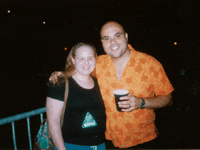Ask The Artists; Barenaked Ladies
StarPolish, August 23rd, 2001.Offering up an eclectic mix of musical genres, the Barenaked Ladies have gone from humble beginnings in Canada to packing concert halls and selling millions of albums throughout the world. Fresh off their latest release, Maroon, the group — comprised of singer-guitarists Ed Robertson and Steven Page, bassist Jim Creeggan, drummer Tyler Stewart, and keyboard player Kevin Hearn — has hit the road on a highly anticipated and so-far successful tour.
Formed in Toronto back in 1988, the Barenaked Ladies released its first album, Gordon, in 1990 — an album that contains two of the group's most popular concert pieces, "If I Had A Million Dollars" and "Be My Yoko Ono." In a testimony to the group's perseverance, it took eight more years for BNL to break it big, which they did with Stunt and its No. 1 single, "One Week." The rest, as they say, is history.
But it's really the band's live show that provides the truest measure of who they — and their legions of fans — really are. Blending BNL's solid musicianship with characteristic smattering of improvisation, anecdotes and just plain nonsense, the show demonstrates the versatility and talent of each member of the band and highlights the group's great chemistry. For example, a recent packed show at the Jones Beach Theater on Long Island, NY was an all-encompassing, fun-filled party that featured the band's rollicking music — including "Pinch Me," the first single off the new album — giant balloon heads, a ridiculous list of things not to do, and fans throwing underwear up on the stage (security had already searched knapsacks and confiscated all the trademark boxes of Kraft macaroni and cheese). As evidence of the bands' ability to take it all in stride, Robertson and Page played a good portion of the show with underwear draped on their guitars.
Just before attending the Jones Beach event, Starpolish reporter Michelle Gesser caught up with drummer Tyler Stewart and discussed the band's road to stardom, constant touring, and dealing with adversity.
STARPOLISH: The band has been through a lot in past years — for example, Kevin's illness [Note: Hearn was diagnosed with leukemia in March of 1998, but has since recovered — Ed.] — yet has continued to flourish. What advise do you have for aspiring musicians and their battles with hardship?
STEWART: Well, with Kev going down it certainly brought us together as a band more, and made us realize we can depend on each other, and we need to depend on each other. I'll use a sports analogy, but it really is a team thing being in a group and being in a band, and you know we really learned the value of being close to each other during that because we were able to support each other and also, as a unit, to support Kevin.
STARPOLISH: So it's more like a family?
STEWART: Yeah, definitely. It takes a while, though. It's like any relationship — it doesn't just happen overnight; you have to strive to achieve a healthy relationship and it really helps to be open and communicate with each other.
 STARPOLISH: A strong fan base is something you all have developed over the years. How would you suggest that other artists establish themselves in terms of listener support?
STARPOLISH: A strong fan base is something you all have developed over the years. How would you suggest that other artists establish themselves in terms of listener support?
STEWART: Well, we just toured everywhere. We made sure we had a good, entertaining live show. That was a building block for us, because if you go out and put on a good show, even if there are only 10 people there, the next time you come through... there may be 10 more because those people might have talked about it. We really built our following up through word of mouth and live playing because it was a while before we got any radio support, particularly in the U.S. So we just managed to be dedicated to touring and playing all the time, and then not taking "no" for an answer. You know, "Get in the van," as Henry Rollins once said, just get in the van and just tour and play.
STARPOLISH: Do you have any suggestions for bands that want to cross over into the U.S., because I know you were big in Canada before you even got here?
STEWART: Well, the U.S. is a big place. The thing about Canada is there are not that many places to play, and the population is one-tenth the size of the U.S. So it's easy to just go and play all the places. And sometimes you fall into the rut of playing the same places all the time. It's good to try and spread out, and we immediately started [playing] just over the border — in places like Buffalo, Detroit and Cleveland — from where we were. That way, if you get people interested there, there is a chance that radio stations might get interested, and radio stations are reported all over the country. S if word of mouth gets around in radio-land, then that helps, too. That's sort of what happened with us.
STARPOLISH: Your music is very eclectic — does that make radio play more difficult?
STEWART: Yes, I think because we're not. . . you can't just put us in a box and categorize our music. I think it changes and it's eclectic in that respect. So yeah, it's definitely been a challenge. But at the end of the day as long as its good... you have to be satisfied with it yourself and I think the way you do that is by putting everything you have into it and ensuring that you feel good about the stuff you're putting out, and do it for you and not for the record company — or for the fans, actually.
STARPOLISH: Often when a band grows musically, their fans want them to stay the same. Have you experienced that? Is there anything you can do to ease the transition for fans?
STEWART: I don't think there is anything you can do to ease the transition at all. People are fickle like that; their tastes change, and you meant something to them at a particular time in their life, and I don't think you can ever repeat the same album twice — and you shouldn't even try to. Growth, both musically and personally, is inevitable. We get people who say, "Yeah, I used to like them, but I like their older stuff — their new stuff sucks." That's fine, because hopefully what you can do is replace them with new people who like your music. I don't think it behooves any band to try to stick to their roots, man, to try to appease the small minority of fans who get alienated when a group changes their sound. I think you have to do what's right for you. The fans are very important, and the listeners are very important, but their fickleness shouldn't be the thing that drives you — your own creative energy and juices should be what drives you.
 STARPOLISH: Well, you've definitely established yourselves in that respect. When I think of the band, I definitely associate it with totally down-to-earth guys — even though you have a documentary and book about you. How did you all keep success from going to your head? Has it had a significant impact on your personality?
STARPOLISH: Well, you've definitely established yourselves in that respect. When I think of the band, I definitely associate it with totally down-to-earth guys — even though you have a documentary and book about you. How did you all keep success from going to your head? Has it had a significant impact on your personality?
STEWART: I think success can't help but change you a little bit, whether it gives you more confidence or it makes you more insecure or whatever. I think we've really strived to be communicative with each other. I think we've strived to be better people. And just the simple fact that we've been together for 11 years shows that it's been fairly successful. Otherwise, we probably would have split a long time ago. I think success for me has allowed me to continue to do what I love and to make a pretty good living doing it. And you know, that me to me is the ultimate in success — that 11 years in I'm still playing drums in a band that I love and I'm managing to earn a living doing it.
STARPOLISH: If you could offer one piece of advice to the bands out there trying to make it, what would it be?
STEWART: Keep doing it; don't give up. Keep on getting better. You'll know if you're destined to do it or not — you know, you'll feel it. If it doesn't make any sense to do anything else, then it's real. Don't listen to whoever it may be, your parents or just the conservative forces at large who say, "Oh, it's too hard, there's so many bands." You can do it if you have good material and you keep working at it.
